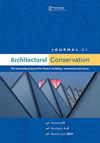Reducing carbon from heritage buildings: the importance of residents’ views, values and behaviours
IF 0.5
3区 艺术学
0 ARCHITECTURE
引用次数: 6
Abstract
ABSTRACT Significant energy and carbon originate in the existing built environment and retrofit is therefore a key carbon reduction strategy. However heritage buildings -comprising around 20% of UK buildings- are challenging to retrofit appropriately due to their historical values and traditional construction. Retrofit carbon savings are dependent on current energy use which is strongly influenced by residents’ behaviours, and retrofit decisions for domestic heritage are generally the responsibility of homeowners. Therefore both residents’ views and behaviours are important for effective retrofit strategies. However behaviours are rarely considered in standard energy models and residents’ views are often overlooked in heritage retrofit policy. This paper analyses a survey of the views, values and behaviours of 147 residents of pre-1940 buildings. The majority are found to strongly value their homes’ heritage and mainly view exterior building alterations negatively. However residents’ heritage values and acceptable retrofits, frequently differ from those of experts and policy makers. Residents report actively engaging in several positive energy behaviours and many have already undertaken common carbon saving measures. These findings imply that, for effective carbon reduction from heritage buildings, policy and legislation needs to extend beyond current definitions of ‘heritage’ and acknowledge residents’ complex values, motivations and energy behaviours.减少遗产建筑的碳排放:居民观点、价值观和行为的重要性
摘要重要的能源和碳源于现有的建筑环境,因此改造是一项关键的碳减排战略。然而,遗产建筑——约占英国建筑的20%——由于其历史价值和传统建筑,很难进行适当的改造。改造碳节约取决于当前的能源使用,而当前的能源利用受到居民行为的强烈影响,而对国内遗产的改造决策通常由房主负责。因此,居民的观点和行为对于有效的改造策略都很重要。然而,在标准能源模型中很少考虑行为,在遗产改造政策中经常忽视居民的意见。本文分析了对147名1940年前建筑居民的观点、价值观和行为的调查。大多数人都非常重视自己房屋的遗产,主要对外部建筑的改建持负面看法。然而,居民的遗产价值观和可接受的改造往往与专家和政策制定者的不同。居民们报告说,他们积极参与了一些积极的能源行为,许多人已经采取了共同的碳减排措施。这些发现意味着,为了有效减少遗产建筑的碳排放,政策和立法需要超越当前“遗产”的定义,承认居民的复杂价值观、动机和能源行为。
本文章由计算机程序翻译,如有差异,请以英文原文为准。
求助全文
约1分钟内获得全文
求助全文

 求助内容:
求助内容: 应助结果提醒方式:
应助结果提醒方式:


